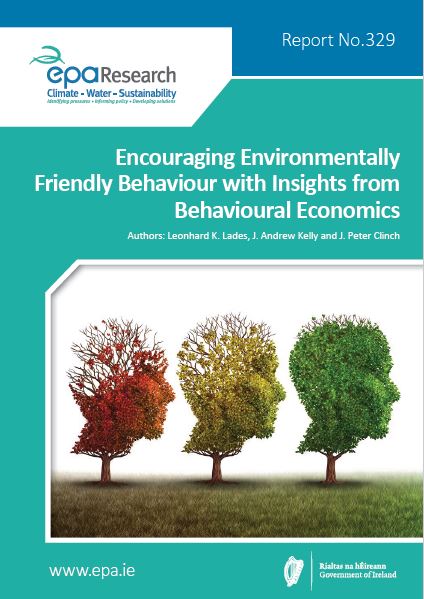Authors: Leonhard K. Lades, J. Andrew Kelly and J. Peter Clinch
Summary: The 2019 Climate Action Plan sets out targets for Ireland in sectors including transport, residential heating and waste. To achieve these targets, infrastructure investments are essential. However, infrastructure investments are not enough, the investments must be paired with broad behavioural change. This report aims to support environmental policymaking in Ireland with the goal of encouraging environmentally friendly behaviour.

The 2019 Climate Action Plan sets out ambitious targets for Ireland in sectors including transport (e.g. to add 500,000 public transport and active travel journeys daily by 2035), residential heating (e.g. to install 600,000 heat pumps by 2030) and waste (e.g. to recycle 70% of packaging waste by 2030). In order to achieve these targets, infrastructure investments are essential. However, infrastructure investments are not enough. The investments must be paired with broad behavioural change. It has become increasingly clear that ignoring the human element reduces the effectiveness of infrastructure investments because of “last mile problems”. There is therefore a pressing need for strategies that encourage environmentally friendly behaviours in all sectors, including transport, residential heating and simple everyday life. These strategies need to be both effective and ethical.
This report draws on insights from the behavioural sciences (mainly behavioural economics and psychology) to support environmental policymaking in Ireland with the goal of encouraging environmentally friendly behaviour across several sectors. The report is divided into five parts that present a methodological guide for behavioural analysis, an appraisal of barriers to smarter travel, design strategies for residential retrofit grant schemes, factors affecting pro-environmental behaviour and a framework for ethical behavioural policymaking. The unifying theme across all parts is the application of insights from the behavioural sciences to environmental policymaking.
Day reconstruction method – A survey technique that allows the gathering of data from people’s everyday lives. The report delivers a six-step guide to assist policymakers in designing day reconstruction studies.
Transport sector – The report analyses the determinants of travel satisfaction and identifies behavioural barriers to “smarter travel”. Recommendations are provided on ways to overcome these barriers.
Residential sector – The report analyses decisions to invest in heat pump retrofits and highlights the “hassle factor” as a major behavioural barrier. The research demonstrates how reducing hassle can be more effective than increasing grants.
Pro-environmental behaviour – The report presents novel day reconstruction method data on everyday pro-environmental behaviours. The report delivers policy design support by highlighting how certain characteristics are linked to more pro-environmental behaviour than others (e.g. in terms of demographics, green identity and altruism).
Ethics of behaviourally informed policymaking – Although behavioural science can offer considerable value to policymaking, ethical boundaries must be defined. The report delivers this through the FORGOOD framework, which highlights seven ethical dimensions: fairness, openness, respect, goals, opinions, options and delegation.
https://www.epa.ie/media/epa-2020/publications/research/Research-329-thumbnail.JPG